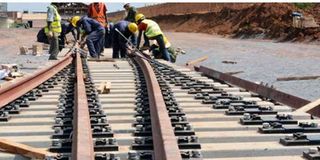Sh1.3tr Standard Gauge Railway funds already disbursed

What you need to know:
- Progress of the construction of the first phase of Tanzania’s Standard Gauge Railway line between Dar es Salaam and Morogoro has reached 28 percent while that of the second phase – which runs fromMorogoroto Dodoma – is over 8 percent, the project manager, Mr MaizoMgedzi, told the Chief of Defense Forces (CDF), General Venance Mabeyo.
Dar es Salaam. The government has so far disbursed Sh1.33 trillion for the construction of the first phase of the standard gauge railway (SGR), which is 28.4 per cent complete, developers said on Tuesday October 09.
The SGR project manager from Tanzania Railways Corporation (TRC), Mr Maizo Mgedzi, said that the entire sum was sourced locally by the government, which was working towards raising more funds to fully finance the project.
“So far, the construction is done by 28.4 per cent,” he told the Chief of Defence Forces, General Venance Mabeyo, and his team when they inspected the SGR project.
He voiced confidence that the Dar es Salaam-Morogoro SGR phase will be completed by November 2019.
According to Mr Mgedzi, actual construction of the SGR second phase between Morogoro and Dodoma has reached 8.7 per cent.
To speed up the construction work, said Mr Mgedzi, TRC was considering recruiting 10,000 more locals for implementation of the second phase.
In the same vein, he said, TRC was also working towards connecting electricity from the national grid to areas covered by the SGR project. A tender towards that goal would soon be announced.
“People should not think that this is a costly project. It has a number of benefits to the country. It will save costs normally spent on repairing roads and also increase the life-span of our roads,” he said.
That is because upon completion of the project, most of the cargo currently transported through the country’s road network will be hauled by railway.
“The plan is to have a cargo train that will travel at 120 kilometres per hour and a passenger train that will move at 160 kilometres per hour,” he said.
Reacting to the briefing, General Mabeyo, promised to offer all the necessary support that TRC may require in the project’s implementation, including more military technical manpower to participate in the construction of the SGR.
TPDF has already made available a total of 57 experts who are working with TRC employees in the project.
General Mabeyo said TPDF was pleased to be involved in a project of this magnitude.
“You can have good equipment and a modern army but if you have poor infrastructure, you can easily lose a battle during a war. With good infrastructure, it is easy for any country to quickly access equipment,” he said.
He added that he was so far satisfied with the progress of the ongoing construction.
The CDF asked TRC for more involvement in every stage of planning and designing of the SGR, saying the defence forces were an important partner in the implementation of the project.
Mr Mgedzi said construction of the Morogoro-Dodoma phase would be finalised by 2021.
In 2016, the government chose Portuguese-Turkish joint venture of YapiMerkezi and MotaEngil to build the $1.2 billion first phase, the longest section of the project.
The line is expected to be electric accommodating speeds of up to 160 kilometres per hour for passenger trains and 120 kilometres per hour for cargo trains.
Analysts are however sceptical that the country’s electricity generation capability might not be enough to power the SGR project, with the Parliamentary Public Investments Committee asking the TRC to table before it before the end of November the electricity supply plan for the line, scheduled for completion in October 2019.
The government has yet to award contract tender for the last two phases of the project, that includes the 300-kilometre Makutupora to Tabora; 135-kilometre Tabora to Isaka and an offshoot from Isaka to Mwanza then the Rusumo border, which will cover close to 250 kilometres.




